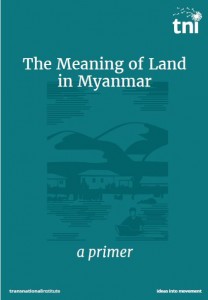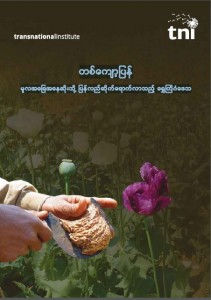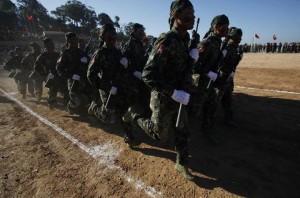Posts Tagged ‘Transnational Institute’ (24 found)
China’s Engagement in Myanmar: From Malacca Dilemma to Transition Dilemma
As neighbours on a strategic crossroads in Asia, the relationship between China and Myanmar is today one of the most important in international geo-politics and regional development. After Myanmar’s independence, tensions with China were often deep as conflict and political turmoil swept both countries […]
• • •The right to land at crossroads in Myanmar
Myanmar is at a historic crossroads: one where the optimism of a critical juncture that is “more promising than at any time in recent memory” meets apprehension over what could happen if a “host of … social crises that have long blighted our country” go unaddressed […]
• • •The Meaning of Land in Myanmar
 “Land is like our vein; it is vital for our living. After our land was confiscated, we don’t know what to do for our livelihood,” says a farmer from Kachin State in Myanmar […]
“Land is like our vein; it is vital for our living. After our land was confiscated, we don’t know what to do for our livelihood,” says a farmer from Kachin State in Myanmar […]
No Women, No Peace: Gender Equality, Conflict and Peace in Myanmar
This briefing explores the gender dimensions and gender impact of conflict in Myanmar. Such information is relatively scarce, and there has long been a need for a deeper understanding of the intersections of gender, ethnicity and other identities in peace-building and democratisation […]
• • •The 2015 General Election in Myanmar: What Now for Ethnic Politics?
Despite huge challenges, election day in Myanmar passed almost entirely peacefully. Aung San Suu Kyi’s National League for Democracy triumphed in polls that were regarded by domestic and international observers as remarkably free from irregularities […]
• • •တစ္ေက်ာ့ျပန္ – မူလအေျခအေနဆိုးသို႔ ျပန္လည္ဆိုက္ေရာက္လာသည့္ ေရႊႀတိဂံေဒသ
TNI ၏ ေရႊႀတိဂံေဒသအတြင္းရွိ တရားမ၀င္မူးယစ္ေဆး၀ါးေစ်းကြက္အေပၚ ႏိႈက္ႏိႈက္ခၽြတ္ခၽြတ္ေလ့လာ ဆန္းစစ္ခ်က္အရဘိန္းစိုက္ပ်ိဳးထုတ္လုပ္မႈ ႏွစ္ဆခန္႔ျပန္လည္ျမင့္တက္လာသည့္အျပင္ ေထာင္သြင္းအက်ဥ္းခ်ခံထားရသူ မ်ားျပားလာၿပီး အေသးစားတစ္ႏိုင္တစ္ပိုင္ ေတာင္သူငယ္ေလးမ်ားအေပၚ ျပင္းျပင္းထန္ထန္ ႏွိပ္ကြပ္လ်က္ရွိေၾကာင္း ေတြ႔ရွိခဲ့ရသည္ […]
Myanmar Opium Farmers’ Forum Report Published Today
Today the Myanmar Opium Farmers’ Forum released the report of its third meeting. The report stresses that farmers grow opium to ensure food security for their families and to provide for basic needs, and to have access to health and education. According to the report, “The large majority of opium farmers are not rich and grow it for their survival. Therefore, they should not be treated as criminals […]”
• • •Election Cancellations Create Further Doubt Over the Transparency and Credibility of Burma’s 2015 Elections
 On 27 October 2015, the Union Election Commission (UEC) announced that elections would be cancelled in four townships in Shan State as a result of the newly intensified fighting between the Burma Army and the Shan State Army-North (SSA-N). According to the Shan State Progressive Party, the political wing of the SSA-N, the Burma Army was seen to ramp up attacks against the SSA-N after they deliberated that they would not be signing the Nationwide Ceasefire Agreement […]
On 27 October 2015, the Union Election Commission (UEC) announced that elections would be cancelled in four townships in Shan State as a result of the newly intensified fighting between the Burma Army and the Shan State Army-North (SSA-N). According to the Shan State Progressive Party, the political wing of the SSA-N, the Burma Army was seen to ramp up attacks against the SSA-N after they deliberated that they would not be signing the Nationwide Ceasefire Agreement […]
Ethnic Politics and the 2015 Elections in Myanmar
Myanmar/Burma is heading to the polls in November 2015, in what will be
a closely watched election. Provided that they are free and fair, the polls
are likely to have a major influence over the future political direction of the
country, with an expected shift in power from the old elite to the opposition
National League for Democracy (NLD) […]
Political Reform and Ethnic Peace in Burma/Myanmar: The Need for Clarity and Achievement
For many citizens a countdown begins to a crucial general election later this year, with warnings of a halt in reform momentum and a more troubling reality behind many of the socio-political changes in the country […]
• • •








 All posts
All posts